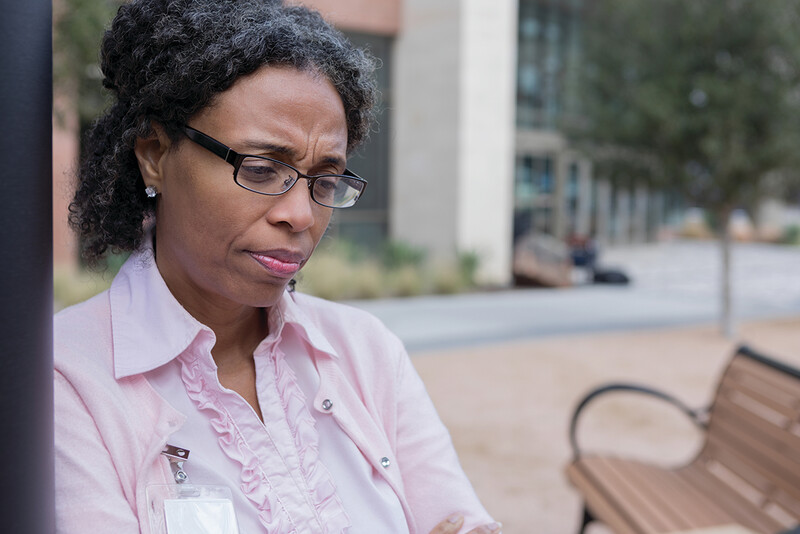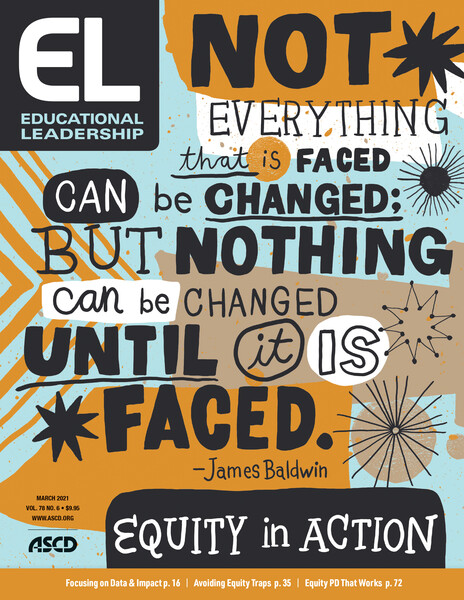The principal of the urban middle school where I was an instructional coach said he was committed to equity. As a heterosexual, white man from an upper middle class, Christian background, he hadn't experienced marginalization because of his identity markers. In contrast, 70 percent of the students at his school were Black. He knew he needed help.
After my first, very challenging year, I told the principal I was quitting. We had a strong relationship, and I was honest: "There's too much toxicity in the staff culture here," I said. Teachers verbally attacked each other in meetings, some refused to attend PD sessions on topics related to equity, and efforts at changing classroom practices seemed to result only in complaints.
He pleaded with me to stay. "We need your perspective," he responded. "You're able to see the inequities like no one else does."
While I appreciated his words, and I saw ways to support change at this school, every day felt like a battle with adults who didn't want to change. I tried raising questions about instructional practices that seemed stuck in the 1950's: weekly spelling tests, diagramming sentences, sitting students in rows. If anyone spoke, it was the teacher. Classroom management focused on controlling behavior. Because of these practices, students were disengaged, their learning needs weren't met, and they acted out.
At the time, my son, who is Black, was just entering the school system. It was difficult for me to witness children who looked like him and me being dehumanized every day.
Triply Challenged
I stayed on, however, fueled by stubbornness and hope. In my second year at the school, which I'll call Highland, the principal was confounded by the high turnover of staff, especially staff who were BIPOC (Black, indigenous, people of color) and committed to equity. Again, I was direct with my observations on what contributed to this attrition, and I hammered in one idea: that for BIPOC staff who were committed to equity, working at this school was doubly or perhaps triply challenging.
There was first the challenge of being a teacher, coach, or dean in an under-resourced district that served communities that had been in crisis for hundreds of years. Second there was the challenge of being BIPOC with likely traumatic memories of being a child in a similarly dehumanizing school system. Third, for many of us, there was the challenge of being a parent to a school-aged child who might be subject to the same dehumanizing ordeal we witnessed every day at this school.
Here's what I didn't describe: Every day, when I dropped off my son at his school, I was terrified about whether he'd be seen for who he truly is, whether he'd be served in the way he deserved. At work, as I walked through classrooms and saw one Black boy after another sent to the timeout chair, or to the office, I couldn't compartmentalize my emotions about that boy being punished from my emotions about my son. Every day, I saw adults sending this message to Black boys: You don't belong here. Get out. What message was my baby getting in his school?
At times, I thought my empathy was too much; I felt drained and hopeless. And there were times when I appreciated my empathy: it propelled me to show up every day. But after coaching at this school for that second year, I was depleted. I quit.
Recognize the Pain
It took time to recognize the extent of the emotional burden that I'd carried at that school. What I witnessed had ignited maternal fears and also surfaced my own long-ignored experiences as a student in a school where adults were focused on controlling children's behavior. I was a shy, quiet, mediocre student who was ignored for many, many years. I see now how much potential I had and lament that I didn't have teachers who cultivated it. I know that it was my race, gender, and socioeconomic status that contributed to those low expectations.
As a coach at Highland, I observed dozens of quiet, shy girls being ignored. I recall a heated discussion with the math department chair after I said that it wasn't OK that 85 percent of female students scored average or below on math exams. "They'll be fine," the department chair said. "Those aren't the kids we need to focus on." I never got above a C in any math class I took, and I've always felt ashamed of this. It took me a long time to realize that part of what contributed to my struggle in math was that I was ignored. A C was seen as being good enough for me.
Educators of color carry the traumas of our abuse in the education system with us every day. Our experiences of being neglected and unseen, excluded, not understood and not valued, untrusted, and underappreciated accompany us. Some of us have attended to our wounds or acquired skills to navigate these fears. Some of us haven't yet worked through this pain—and may even unconsciously project our pain onto other children, including at times children of color.
Questions for School Leaders
The injustices BIPOC folks experience extend beyond the education system; we encounter racism and systemic oppression just about everywhere. Our identities aren't defined by suffering—there are all kinds of gifts and beauty in our identities. But we also have pain. School leaders committed to hiring, retaining, and sustaining BIPOC educators must be aware of that pain (or trauma) we hold. That's the first step.
Current school leaders may not be responsible for the wrongs of our past, but they must take responsibility for the wrongs of today—and for providing resources for healing past wrongs. When I coach leaders who lament the high turnover of BIPOC educators, I ask them these questions (among others):
- What do you know about the experiences of Black, indigenous, people of color working here? How do you gather that data? How often do you gather it? How reliable do you think it is—do folks trust you enough to be honest and share their stories?
- What is your commitment to equity? How do you make this commitment known?
- What reflection and learning have you done about your own racial identity journey? What does your staff know about this journey?
- What opportunities do BIPOC staff have to convene and share their experiences with each other? Are there spaces for them to connect?
- What resources do you provide BIPOC staff to help them recover from past educational traumas?
These questions emerge from three general understandings (the last being perhaps the most controversial): (1) It's often very lonely being a BIPOC educator; (2) our stories are rarely heard, and when we can share them in a fairly safe space, the experience is cathartic; and (3) BIPOC educators deserve to have a reduced workload and additional resources to tend to the traumas we've experienced. This last recommendation could take the form of a therapy-stipend and weekly release time for therapy, coaching, or other ways to heal.
Support Leaders and Coaches
In a recent one-off coaching session, I coached a BIPOC school leader around leading for equity. He shared with me the racial identity experiences he'd had as a child and adult. At the end of the conversation, he remarked that although it was late afternoon, he was feeling energized.
"I wish I had a coach to talk to regularly," he observed. "I feel like this conversation peeled off many layers of pain that I've been carrying."
Leaders deserve coaching, too. When I recall my years at Highland, I suspect that if I'd had a skilled coach, I would have been more effective and would've stayed longer. Since then, I've begun to process my pain and heal. I've also strengthened my resilience and my ability to coach and lead for equity. Although I believe we're individually responsible for tending to our pain, leaders can create conditions for all BIPOC educators to heal.







